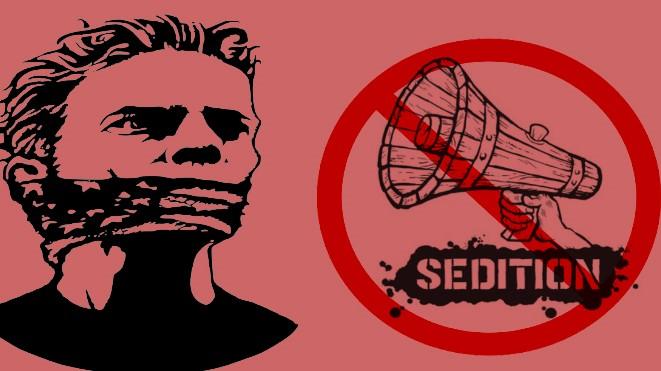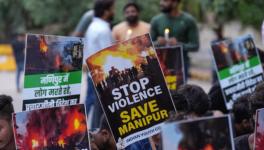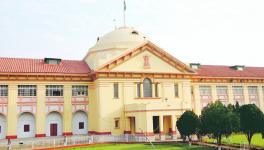Another Curve Fails to Flatten: BJP’s Use of Sedition Law

The National Investigation Agency (NIA) arrested Delhi University associate professor of English Hany Babu MT on 28 July in connection with the Bhima Koregaon case. He is the 12th person to be held in this connection.
A recapitulation of the case would help make some important arguments about the character of the regime regrettably in power in this country. On 31 December 2017, an event called Elgar Parishad was staged in Pune as a part of a programme celebrating the battle of Koregaon, in which a British regiment assisted by a Mahar contingent had defeated an army of the Peshwas, then holding the reins of the Maratha empire, on 1 January 1818.
The event, consisting of cultural performances and speeches in support of Dalit empowerment and against Dalit oppression, the caste system and the communal violence being instigated by Hindutva organisations, had passed off uneventfully. It had been preceded by two marches passing through several parts of Maharashtra, which converged at Pune, where public meetings were held. One of the organisers of the Elgar Parishad was BG Kolse-Patil, a retired judge of the Bombay High Court.
On the following day, hundreds of thousands of Dalits gathered at Bhima Koregaon to celebrate the 200th anniversary of the battle. Hindutva activists attacked the gathering, which sparked off violence at the venue and statewide protests in the following days. Two young men died in the violence, one of them reportedly after being beaten by police.
Investigations initially centred on the role of Hindutva activists. FIRs were filed on 2 January against Manohar Bhide, aka Sambhaji and Guruji, founder of the Shiv Pratishthan Hindustan and erstwhile Rashtriya Swayamsevak Sangh activist, and Milind Ekbote, another Hindutva activist. Ekbote was arrested in March, but only after strictures were passed against the Pune police by the Supreme Court. Bhide, who is reportedly close to Prime Minister Narendra Modi, was never even questioned.
It was later reported that a committee constituted by the Pune police had submitted a report on 20 January nailing Bhide and Ekbote for orchestrating the violence on 1 January 2018. Nevertheless, in a curious twist, the investigation into the role of Hindutva storm troopers was not seriously pursued. Instead, the Pune police turned their attentions to Dalit and civil rights activists, accusing them of being implicated in CPI (Maoist) activities. Laughably, some of them were accused of hatching a conspiracy to assassinate Modi.
The 12 people arrested till now in connection with the Elgar Parishad and Bhima Koregaon cases are Surendra Gadling, Rona Wilson, Shoma Sen, Sudhir Dhawale and Mahesh Raut, held on 8 June 2018 for inciting the riots; and Varavara Rao, Sudha Bharadwaj, Gautam Navlakha, Vernon Gonsalves and Arun Ferreira, picked up in countrywide dawn raids on 28 August 2018. Rings a bell? Anand Teltumbde was arrested initially on 3 February 2019, released the same day and re-arrested on 16 March, this year. As mentioned, Hany Babu was detained last week. All of them were activists and some of them lawyers and academics as well.
On Sunday, an NIA team searched Babu’s flat, taking away documents, copies of a pamphlet and computer disks and pen drives. Among the many “charges” made against Babu in an agency statement was taking the initiative to organise financial assistance for a Maoist leader who had been released from prison and forming a committee to press for the release of disabled Delhi University teacher GN Saibaba, currently serving a life sentence for Maoist links. The presumption, or insinuation, that these are criminal activities is surreal, but entirely in keeping with the arbitrary and authoritarian character of the current regime.
Among the several things that stand out in this as yet incomplete saga is the fact that after the current government came to power in Maharashtra in November 2019 and had reportedly started to consider dropping these cases, the Modi regime stepped in and transferred them from the state police to the NIA.
The point of going into this background is to make clear the determination of the current dispensation to protect its own from criminal delinquencies, while persecuting those whose activities and ideological positions constitute dissent against and a critique of the obscurantist, exclusionary and majoritarian ideology of Hindutva. It should be noted that charges brought against the activists are under the anti-sedition provisions of the Indian Penal Code or the Unlawful Activities (Prevention) Act.
We must examine whether the Bhima Koregaon case is an anomaly. Clearly, it is not. There is a clear pattern in the actions of the regime in power. Take the Delhi riots earlier this year. There is no doubt of the instigation by members of Bharatiya Janata Party (BJP), specifically Kapil Mishra, who had days before been trounced in the Delhi Assembly elections, and other activists of the egregious entity known as the Sangh parivar.
Yet, the Delhi Police, with its appalling post-2014 record, has not proceeded against Mishra and his cohorts. On the contrary, its energies have so far been expended chiefly in arresting young Muslim men. It is not exactly a secret that the Muslim community, which lost lives, homes, businesses and places of worship while the police either stood by idly or participated in the attacks against it, was preponderantly the victim of the riots.
At the same time, the Delhi Police has also been productively engaged in proceeding against Muslims who participated in the movement against the Citizenship (Amendment) Act (CAA), 2019, and National Register of Citizens, while giving a clear run to those who made incendiary speeches during the Delhi Assembly election campaign. Apart from Mishra himself were other luminaries such as Minister of State for Finance Anurag Thakur, who exhorted an audience to shoot people he considers traitors, and BJP Lok Sabha member Parvesh Verma.
The BJP’s massive win in the 2019 Lok Sabha elections has obviously emboldened it to launch an undisguised attack on the minorities, but this had been foreshadowed during its earlier term in power when the party and the governments it ran at the Centre and in the states encouraged the indiscriminate lynching of Muslims on the pretext that they had slaughtered cows, were transporting cows for slaughter or were in possession of beef. Instead of the killers being prosecuted, all too often the victims of lynch attempts and serious assault were prosecuted and persecuted.
Hany Babu’s arrest is another signpost on the way to the BJP’s attempt to convert India into an intolerant and toxic theocratic state in which the writ of the pedlars of a “muscular”, hardline Hindutva will prevail. If that is the objective of this regime, the instruments are the dismantling of democratic institutions, from autonomous bodies to the judiciary itself, and the subversion of constitutional provisions and values.
In the absence of institutional checks and a robust political pushback India is also beginning to look like a police state. Sample this. According to National Crime Records Bureau (NCRB) the antiquated, colonial-era law on sedition, which many lawyers and jurists say should be taken off the statute book because it has no place in a democratic state, has been invoked 233 times between 2014 and 2018. The NCRB has been collecting data on sedition cases from 2014, but there seems to have been an exponential increase in its invocation. There is no data for 2019-20 yet, but impressionistically speaking the curve doesn’t seem to have flattened.
Under a duumvirate that has effectively seized power in a Bonapartist manoeuvre and a regime that has the stated aim of extinguishing political opposition, the world’s “largest democracy” is being bulldozed into the world’s largest tinpot, one-party theocracy. Citizens’ resistance, as embodied in the anti-CAA protests, and a democratic, secular reconstruction of the opposition space must urgently be undertaken to forestall this eventuality.
The author is a freelance journalist and researcher. The views are personal.
Get the latest reports & analysis with people's perspective on Protests, movements & deep analytical videos, discussions of the current affairs in your Telegram app. Subscribe to NewsClick's Telegram channel & get Real-Time updates on stories, as they get published on our website.
























